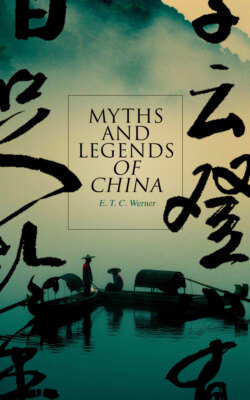Читать книгу Myths and Legends of China - E. T. C. Werner - Страница 37
На сайте Литреса книга снята с продажи.
Superstitions
ОглавлениеAn almost infinite variety of superstitious practices, due to the belief in the good or evil influences of departed spirits, exists in all parts of China. Days are lucky or unlucky. Eclipses are due to a dragon trying to eat the sun or the moon. The rainbow is supposed to be the result of a meeting between the impure vapours of the sun and the earth. Amulets are worn, and charms hung up, sprigs of artemisia or of peach-blossom are placed near beds and over lintels respectively, children and adults are 'locked to life' by means of locks on chains or cords worn round the neck, old brass mirrors are supposed to cure insanity, figures of gourds, tigers' claws, or the unicorn are worn to ensure good fortune or ward off sickness, fire, etc., spells of many kinds, composed mostly of the written characters for happiness and longevity, are worn, or written on paper, cloth, leaves, etc., and burned, the ashes being made into a decoction and drunk by the young or sick.
Divination by means of the divining stalks (the divining plant, milfoil or yarrow) and the tortoiseshell has been carried on from time immemorial, but was not originally practised with the object of ascertaining future events, but in order to decide doubts, much as lots are drawn or a coin tossed in the West. Fêng-shui, "the art of adapting the residence of the living and the dead so as to co-operate and harmonize with the local currents of the cosmic breath" (the yin and the yang: see Chapter III), a doctrine which had its root in ancestor-worship, has exercised an enormous influence on Chinese thought and life from the earliest times, and especially from those of Chu Hsi and other philosophers of the Sung dynasty.
